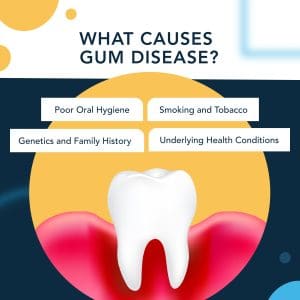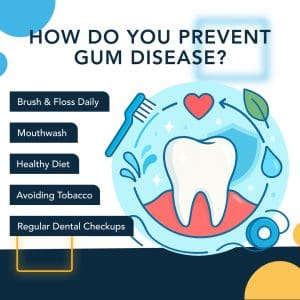Healthy gums are the foundation of a strong smile, yet they are often overlooked in daily oral care routines. Gum disease, also known as periodontal disease, is a common but preventable condition that can lead to serious dental issues if left untreated.
By maintaining good oral hygiene, making smart lifestyle choices, and visiting your dentist regularly, you can protect your gums and overall oral health. In this article, we’ll explore the best strategies for preventing gum disease and keeping your smile healthy for years to come.
H2: What Is Gum Disease?
Gum disease, or periodontal disease, is an infection of the gums caused by bacteria buildup along the gumline. It begins with gingivitis, a mild form of gum inflammation, and can progress to periodontitis, a more severe condition that can damage the soft tissue and bone supporting your teeth. If left untreated, gum disease can lead to tooth loss and other serious health complications. Recognizing the signs early can help prevent further damage. Some of the most common symptoms include:
- Red, swollen, or tender gums
- Bleeding gums, especially when brushing or flossing
- Persistent bad breath or a bad taste in the mouth
- Receding gums or teeth appearing longer
- Loose or shifting teeth
- Pus between teeth and gums
H2: What Causes Gum Disease?
Gum disease develops when bacteria and plaque accumulate along the gumline, leading to inflammation and infection. While poor oral hygiene is a leading cause, other factors such as lifestyle choices, genetics, and overall health can also increase the risk. Understanding these contributing factors can help you take proactive steps to maintain healthy gums and prevent periodontal disease.
H3: Plaque Buildup and Bacteria Overgrowth
Plaque is a sticky film of bacteria that constantly forms on your teeth and gums. If not removed through proper brushing and flossing, plaque hardens into tartar, which irritates the gums and creates an environment for bacteria to thrive. This overgrowth triggers inflammation, leading to the early stages of gum disease. Regular oral care and professional cleanings are essential for keeping plaque under control.
H3: Poor Oral Hygiene Habits
Neglecting daily oral care significantly increases the risk of gum disease. Failing to brush and floss properly allows plaque and bacteria to accumulate, leading to gum inflammation and infection. Skipping dental checkups can also allow minor gum issues to go unnoticed and progress into more severe conditions. Consistent and thorough oral hygiene is key to preventing gum disease.
H3: Smoking and Tobacco Use
Smoking and tobacco use are major risk factors for gum disease. Tobacco weakens the immune system, making it harder for the body to fight infections, including those affecting the gums. Smokers are more likely to experience gum recession, delayed healing after dental procedures, and an increased risk of severe periodontal disease. Quitting tobacco use can greatly improve gum health and reduce the risk of complications.
H3: Genetics and Family History
Some individuals may be genetically predisposed to gum disease, even with good oral hygiene. If close family members have a history of periodontal issues, there may be an increased risk of developing similar conditions. While genetics play a role, maintaining a strong oral care routine and visiting the dentist regularly can help manage and minimize the effects of hereditary factors.
H3: Underlying Health Conditions
Certain health conditions, such as diabetes, heart disease, and autoimmune disorders, can increase the risk of gum disease. Diabetes, in particular, affects the body’s ability to fight infections, making gums more susceptible to inflammation and infection. Managing overall health and keeping systemic conditions under control can help reduce the likelihood of gum-related issues.
H3: Poor Diet and Nutritional Deficiencies
A diet lacking essential nutrients can weaken the immune system and negatively impact gum health. Vitamin C, for example, is crucial for maintaining strong gums and preventing inflammation. Consuming excessive sugary or processed foods also fuels bacteria growth, contributing to plaque buildup and gum disease. Eating a balanced diet rich in vitamins and minerals helps support overall oral health and strengthens the gums.
H2: How Do You Prevent Gum Disease?
Preventing gum disease starts with maintaining good oral hygiene and making healthy lifestyle choices. By taking proactive steps to care for your gums, you can reduce the risk of inflammation, infection, and long-term dental issues. Below are some of the most effective ways to keep your gums healthy and free from disease.
H3: Brushing and Flossing Daily
Brushing twice a day with fluoride toothpaste and flossing daily are essential for removing plaque and food particles that contribute to gum disease. Use a soft-bristled toothbrush and gentle, circular motions to clean along the gumline without causing irritation. Flossing helps remove plaque between teeth where a toothbrush cannot reach, reducing the risk of gum inflammation.
 H3: Using Antimicrobial Mouthwash
H3: Using Antimicrobial Mouthwash
An antimicrobial or antibacterial mouthwash can help reduce plaque, bacteria, and inflammation. Rinsing with a dentist-recommended mouthwash after brushing and flossing provides an extra layer of protection against gum disease. Look for mouthwashes containing chlorhexidine or essential oils to help fight bacteria and maintain fresh breath.
H3: Maintaining a Healthy Diet
A diet rich in vitamins and minerals supports gum health and strengthens the immune system. Foods high in vitamin C, such as citrus fruits and leafy greens, help reduce inflammation and promote tissue healing. Avoiding excessive sugar and processed foods can also help prevent plaque buildup and bacterial overgrowth in the mouth.
H3: Avoiding Tobacco Products
Smoking and using tobacco products significantly increase the risk of gum disease by weakening the immune system and reducing blood flow to the gums. Quitting smoking or avoiding tobacco altogether can greatly improve gum health and help prevent periodontal disease from developing or worsening.
H3: Managing Underlying Health Conditions
Conditions like diabetes and heart disease can affect gum health and increase susceptibility to infections. Managing these conditions through proper medication, a balanced diet, and regular medical checkups can help lower the risk of gum disease. If you have a health condition that affects your immune system, inform your dentist so they can provide personalized care.
H3: Scheduling Regular Dental Checkups
Routine dental visits are crucial for preventing gum disease. A dentist can detect early signs of gum issues and provide professional cleanings to remove plaque and tartar buildup. If you’re searching for a dentist near me, scheduling a visit with a dentist in Davie, Florida can help protect your gums and overall oral health.
H2: Signs You May Have Gum Disease
Gum disease often develops gradually, and many people may not recognize the early warning signs. Paying attention to changes in your gums and overall oral health can help detect the condition before it progresses. If you notice any of the following symptoms, it is important to take action and consult a dentist to prevent further complications.
H3: Swollen or Tender Gums
Healthy gums should be firm and pale pink. If your gums appear red, swollen, or feel tender to the touch, it may indicate inflammation caused by bacteria buildup. Swollen gums are often an early sign of gingivitis and, if left untreated, can lead to more severe periodontal disease. Addressing inflammation early can help protect your gums and prevent further damage.
H3: Bleeding Gums
Gums that bleed easily when brushing or flossing are a common indicator of gum disease. While occasional bleeding may be due to brushing too hard, persistent bleeding is often a sign of gum inflammation or infection. If your gums frequently bleed, it is essential to improve your oral hygiene routine and seek professional dental care to prevent the condition from worsening.
H3: Receding Gums
Gum recession occurs when the gum tissue pulls away from the teeth, exposing more of the tooth’s surface or even its roots. This can lead to increased sensitivity, a higher risk of decay, and an uneven gumline. Receding gums are often a sign of advancing gum disease and should be addressed promptly to prevent further deterioration of gum and bone support.
H3: Gum Sensitivity or Discomfort
If your gums feel unusually sensitive, irritated, or sore, it may be a sign of gum disease. This discomfort can be triggered by eating certain foods, brushing, or flossing. Sensitivity often indicates underlying inflammation or infection and should not be ignored. Identifying and treating the cause early can help prevent gum disease from progressing.
H3: Persistent Bad Breath
Chronic bad breath, also known as halitosis, can be a symptom of gum disease. When bacteria accumulate in the mouth due to plaque buildup and gum infections, it can create an unpleasant odor that does not go away with regular brushing or mouthwash. If you experience persistent bad breath despite good oral hygiene, it may be time to visit your dentist for an evaluation.
H2: Treatments for Managing Gum Disease
When gum disease progresses beyond the early stages, professional treatment is necessary to prevent further damage and restore gum health. Depending on the severity of the condition, different treatment options may be recommended. From deep cleanings to surgical interventions, these treatments aim to remove infection, reduce inflammation, and support the regeneration of healthy gum tissue.
H3: Scaling and Root Planing (Deep Cleaning)
Scaling and root planing is a non-surgical treatment used to remove plaque and tartar buildup beneath the gumline. During this procedure, the dentist or hygienist scrapes away hardened deposits (scaling) and smooths the root surfaces (root planing) to help gums reattach to the teeth. This deep cleaning helps reduce bacterial infection and prevents further progression of gum disease.
H3: Laser Therapy
Laser therapy is a minimally invasive treatment option that uses specialized lasers to remove infected gum tissue and kill bacteria without the need for incisions. Compared to traditional gum surgery, this procedure promotes faster healing, reduces discomfort, and minimizes bleeding. Laser therapy is often used alongside scaling and root planing to enhance treatment outcomes.
H3: Surgical Treatments
In cases of advanced gum disease, surgical treatments may be necessary to restore gum health. Procedures such as flap surgery (pocket reduction surgery) involve lifting the gums to remove deep tartar deposits and then suturing them back in place. This helps reduce pocket depth and makes it easier to maintain proper oral hygiene. Surgical intervention is typically recommended when other treatments have not been effective.
H3: Antibiotic and Antimicrobial Therapy
Antibiotics and antimicrobial treatments are often used to help control bacterial infections associated with gum disease. These may include antibiotic gels applied directly to gum pockets, antimicrobial mouth rinses, or oral medications prescribed by a dentist. While these treatments help reduce bacteria, they are usually used in combination with other procedures, such as deep cleanings, for the best results.
H3: Bone Grafting and Regenerative Procedures
For severe cases where gum disease has caused significant bone loss, bone grafting and regenerative procedures may be necessary. Bone grafts use natural or synthetic materials to restore lost bone structure and support the teeth. Regenerative techniques, such as guided tissue regeneration or growth factor applications, help stimulate new bone and gum tissue growth, improving stability and overall oral health.
H2: Schedule Your Next Dental Checkup Today
Regular dental checkups are essential for preventing and managing gum disease. A professional cleaning and exam can help detect early signs of gum issues before they become serious problems. If you’re looking for a Davie dentist to protect your gum health, now is the perfect time to schedule an appointment. Our experienced team provides top-quality care for patients of all ages. Whether you need a routine cleaning or advanced periodontal treatment, a dentist in Davie, Florida can help. Serving patients throughout Broward County, we’re committed to keeping your gums and smile healthy!
June 28, 2025

 Adult
Adult




 H3: Using Antimicrobial Mouthwash
H3: Using Antimicrobial Mouthwash